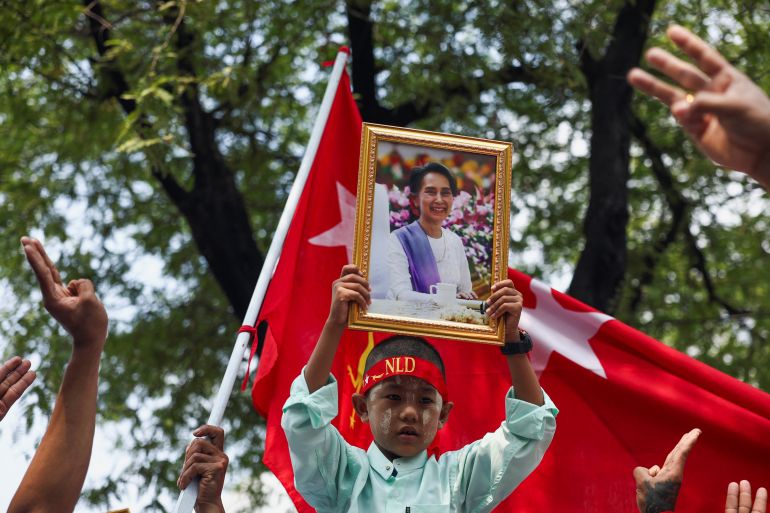Myanmar’s Aung San Suu Kyi moved to house arrest amid heatwave
Military also pardons 3,000 prisoners to mark this year’s traditional New Year holiday.

Myanmar’s jailed former leader and Nobel laureate Aung San Suu Kyi has been moved from prison to house arrest as a health measure amid a severe heatwave, the military has said.
Major General Zaw Min Tun told foreign media on Tuesday that Aung San Suu Kyi and the president of her toppled government, Win Myint, were among the elderly and infirm prisoners transferred from prison.
Keep reading
list of 4 itemsThailand’s top diplomat visits Myanmar border amid clashes, evacuations
Why the fall of Myawaddy, Myanmar’s ‘gateway’ to Thailand, is so important
Singapore ‘tightens screws’ on Myanmar generals with arms trade crackdown
“Since the weather is extremely hot, it is not only for Aung San Suu Kyi… For all those, who need necessary precautions, especially elderly prisoners, we are working to protect them from heatstroke,” he was quoted as saying.
Aung San Suu Kyi, 78, has been imprisoned by the Myanmar military since it overthrew her government in a coup in 2021.
She has been serving a 27-year prison term in Naypyidaw on a variety of criminal convictions that her supporters and rights groups say were fabricated for political reasons. Win Myint was serving an eight-year prison sentence in Taungoo in Myanmar’s Bago Region.
Myanmar’s meteorological department said Naypyidaw saw temperatures of 39 degrees Celsius (102.2 degrees Fahrenheit) on Tuesday.
Zaw Min Tun did not say where the released prisoners were being moved to. Before being sent to prison, Aung San Suu Kyi was reportedly held in a safe house inside an army base.
In February, Aung San Suu Kyi’s son Kim Aris said she was being held in solitary confinement and that she was in good spirits “even if her health is not as good as it was in the past”.
Aris had previously said that reports that his mother had been moved to house arrest in July of last year were not true. At the time, he called the reports “disinformation” disseminated by the military to appease the international community.
Many governments around the world have called for the unconditional release of Aung San Suu Kyi and thousands of other political prisoners and some, including the United States, European Union and the United Kingdom, have levelled sanctions against the Southeast Asian country’s military.
Three years since the coup, Myanmar’s military is facing the biggest challenge to its rule as an armed resistance movement, allied with the National Unity Government (NUG) set up by politicians allied to Aung San Suu Kyi, gathers pace on several fronts.
A spokesperson for the NUG on Tuesday called for Aung San Suu Kyi and Win Myint’s unconditional release.
“Moving them from prisons to houses is good, as houses are better than prisons,” spokesperson Kyaw Zaw told the Reuters news agency late on Tuesday.
“However, they must be unconditionally freed. They must take full responsibility for the health and security of Aung San Suu Kyi and U Win Myint.”
News of Aung San Suu Kyi’s transfer came as the military also granted amnesty for more than 3,000 prisoners to mark this week’s traditional Thingyan New Year holiday.
It was not immediately clear if those released would include pro-democracy activists and political prisoners who were arrested for protesting against army rule.
State-run MRTV said that the head of the ruling military council, Senior General Min Aung Hlaing, had pardoned 3,303 prisoners, including 28 foreigners who will be deported from Myanmar. He also reduced sentences for others.
Mass amnesties on the holiday are not unusual in Myanmar.
The Assistance Association for Political Prisoners (AAPP), which has been monitoring the post-coup crackdown, said in its most recent update on April 12 that some 20,351 people were in detention for opposing the military.